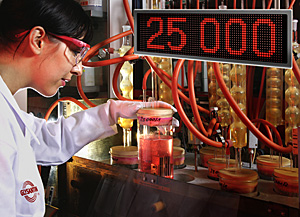Feb 13 2008
A high-performance product is being put to the test: Boiling-hot engine coolant is passed over two metal discs made of aluminum and cast iron. Even after 72 hours, no changes are evident on the material - Glysantin® from BASF, Europe’s best- selling engine coolant, has passed another quality test.

The tests in BASF’s engine coolants laboratory involve simulating the conditions in a modern motor vehicle cooling system. “Recently, we successfully carried out the 25,000th corrosion test for Glysantin,” reports Ladislaus Meszaros, who is responsible for the worldwide development and applications technology of automotive fluids in BASF’s Performance Chemicals division. Since 1960, Glysantin®, which was first patented by the company in 1929, has been subjected to around 400 tests every year.
The background: A high-quality coolant must protect the radiator not only against frost and overheating, but also against rust. After all, the water in the cooling system combined with the high operating temperatures promotes corrosion. Without protection, the rust would soon eat its way through the metal walls of the radiator. BASF’s coolants specialists have now developed about 40 different corrosion tests. “We work with both dynamic and static test setups,” explains Meszaros. During dynamic testing the heated coolant is passed over various metals such as aluminum, brass, copper or cast iron, while in the static tests the materials are kept in a strong solution of Glysantin for a prolonged period. “The fact that the test specimens are in perfect condition at the end of testing clearly demonstrates that Glysantin provides reliable protection against corrosion for all the metals and alloys used in the cooling system,” continues Meszaros. This ensures that the water pump, radiator, heat exchanger, thermostat and cooling channels in the motor and cylinder head continue to work effectively. In addition, Glysantin provides reliable protection for types of rubber and plastics used for cooling hoses, gaskets and header tanks.
Because of advances in motor technology, corrosion tests have become more and more complex over the years. “Usually it is our customers from the automotive industry who approach us with new requirements,” reports Meszaros. If, for example, manufacturers want to use a new material in the cooling system of their vehicles, BASF’s specialists carry out tests to establish whether it is compatible with Glysantin. Sometimes the composition of the coolant has to be modified several times. In the past, this led time and time again to different, customized Glysantin products for different types of motor. To obtain the optimum result, the coolant team can, for example, modify the concentration of the various inhibitors, i.e., the substances that combine with the metals to form a protective coating. The fact that Glysantin has had the most OEM approvals for years proves how satisfied automotive manufacturers are with the quality of BASF’s engine coolant.
The outstanding quality of Glysantin has also been confirmed repeatedly by independent institutes. Since receiving the distinction for the first time in 1996, the product has been awarded the “specially recommended” seal of approval by the international testing and certification company DEKRA on several occasions. This top-ranking seal of approval is only awarded to a coolant if it scores top marks in all test categories.